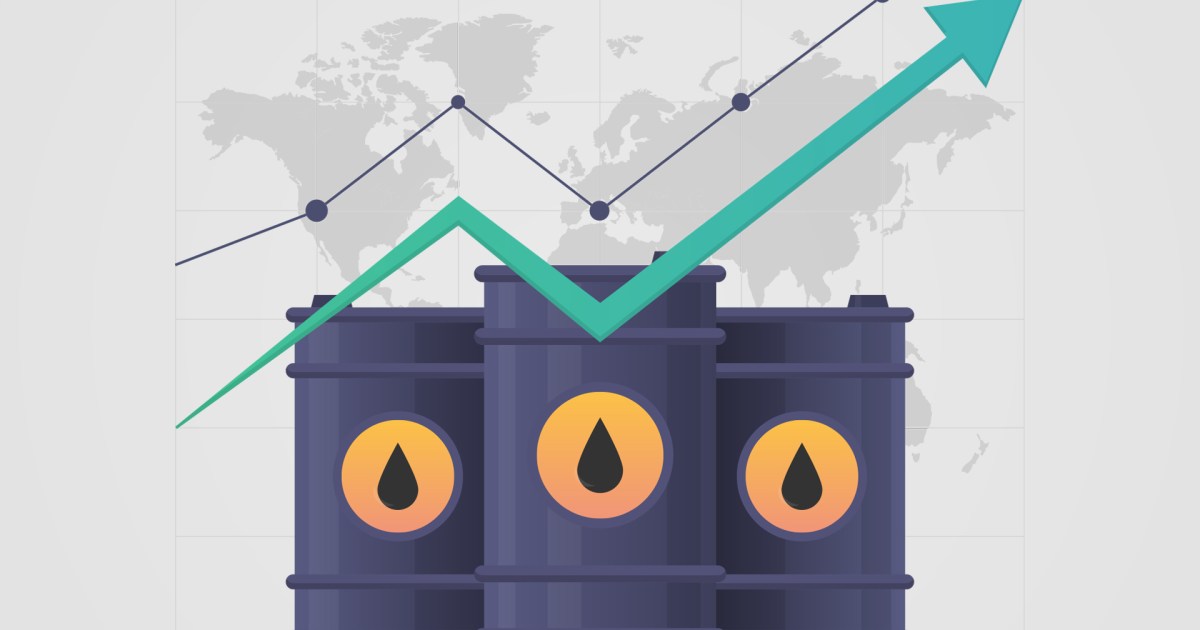On Wednesday, the price of Brent crude exceeded the threshold of $110 a barrel, while the price of West Texas Intermediate crude jumped more than 5%, a rise caused by mounting concerns about oil supplies due to Russia's ongoing war on Ukraine and the sanctions that are heaping on Moscow.
This comes at a time when dozens of countries decided to pump 60 million barrels of oil from the strategic reserve, in an effort to curb prices.
The price of a barrel of Brent crude jumped by 4.88% to reach 110.09 dollars, while the price of West Texas Intermediate crude increased by 5.06% to reach 108.64 dollars per barrel.
The increasing sanctions imposed by Western countries on Russia raise fears of stopping Russian exports of oil and gas, which is reflected in a rise in prices.
Russian supplies constitute about 40% of European gas needs, while about 2.3 million barrels of Russian crude travel west every day through a network of pipelines.
Russia's production rate of crude oil exceeds 13 million barrels per day, and it is the second largest exporter of crude in the world after Saudi Arabia.
Withdrawal from strategic precautions
Yesterday, Tuesday, 31 countries decided to pump 60 million barrels of oil from the strategic reserve, half of them from the United States, in an effort to curb prices and ensure the stability of the oil market with the continuation of the Russian military operation in Ukraine.
The International Energy Agency said, in a statement, that the decision issued by the agency’s panel of governors (consisting of representatives of 31 countries) is a unified and strong message to global oil markets that there will be no shortage of supplies.
In its statement, the agency added that the military operation in Ukraine is taking place on the impact of already limited oil markets, increasing price volatility and commercial stocks, which are at their lowest levels since 2014.
In Washington, the US Department of Energy announced, in a statement, the United States' commitment to pumping 30 million barrels of strategic oil reserves as part of a coordinated operation with other allies to use 60 million barrels.
The statement quoted US Energy Secretary Jennifer Granholm as saying that Washington and its allies are ready to take additional measures if circumstances require.
In a separate statement, White House spokeswoman Jen Psaki said her country was ready to use every available tool to prevent disruption to global energy supplies as a result of Russian President Vladimir Putin's actions.
"We will also continue our efforts to accelerate the diversification of energy supplies away from Russia, and to secure the world from Moscow's weaponization of oil and gas," Psaki added.
In his first speech on the state of the union on Tuesday evening, US President Joe Biden announced before Congress that the United States will withdraw from its strategic reserves 30 million barrels of oil to stabilize the market.
But news of that drawdown, which equates to less than a day's worth of oil consumption around the world, only underscored market fear that supply would be insufficient to offset the growing energy disruptions.
The global benchmark Brent crude contracts ended the trading session yesterday, Tuesday, 7.1% higher, to record at the settlement of about 105 dollars per barrel, the highest closing level since August 2014. The US West Texas Intermediate crude contracts also jumped 7.69 dollars, to reach at the settlement of 103.41 dollars per barrel.
Russia started a war on its neighbor Ukraine at a time when prices were rising mainly due to lack of supplies and a strong recovery in demand around the world as a result of many countries lifting the restrictions imposed to combat the Covid pandemic.
Pressures on the global oil market increased after reports that the members of the "OPEC Plus" alliance - which includes 13 member countries of the "OPEC" (OPEC) led by Saudi Arabia and producers from outside it led by Russia - are heading to maintain a cautious increase in production.
The coalition ministers meet today, Wednesday, amid expectations of maintaining an approved increase in production at a rate of 400,000 barrels per day for the month of next April, despite pressures led by the United States to pump more crude to curb prices.

